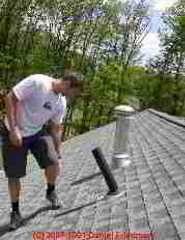 Plumbing Vent Rooftop Caps & Screens
Plumbing Vent Rooftop Caps & Screens
Prevent downdrafts & debris-clogging
- POST a QUESTION or COMMENT about selecting a wind diverter, downdraft preventer, or screen for a plumbing vent at the rooftop of a building
Plumbing vent top screens or wind diverters can prevent downdrafts in the plumbing vent system, odors, backdrafting, and clogging from leaves, pine needles or even animals.
This article series describes how to examine the building's plumbing vent system piping and connections in order to diagnose, find, and cure odors in buildings including septic or sewage or sewer gas smells or plumbing drain and fixture noises that may appear indoors or outside.
InspectAPedia tolerates no conflicts of interest. We have no relationship with advertisers, products, or services discussed at this website.
- Daniel Friedman, Publisher/Editor/Author - See WHO ARE WE?
Plumbing Vent Top Covers, Screens, Diverters
Where the vent pipe exits the roof, and depending on variables such as roof slope, site or terrain features, wind direction, and other factors, there is potential for downdrafts sending sewer gas odors back down the plumbing vent system where at a dry trap or leak in the piping those gases and smells may enter the building.
Above, probably installed to try to avoid downdrafts into the plumbing vent system in windy conditions, is a a 90 degre elbow installed atop a plumbing vent - making us question the workmanship of this job and raising an alert for other plumbing vent snafus.
[Click to enlarge any image]
Watch out: some plumbing ventt top covers like the one shown below nclude a screen which can slide down, closing off the vent and causing sewer gas backups in the building.'
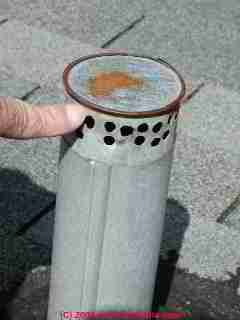
Our photos above show how we simply raised the screen back up to open an old sheet-metal vent.
We have sometiems found plumbing bents blocked by wasps nests, birds, and even a frog in a plumbing vent seen from the rooftop (shown above) discussed in more detail
at PLUMBING VENT DEFECTS & NOISE
Additionally, precipitation, debris from trees, or small rodents or birds may enter the vent pipe leading to a possible clog, blockage, or dead animal that was unable to get out again.
There are roof vent caps and screens designed specifically for the purpose of preventing these issues and the type of vent cap you choose will depend on what problem you are trying to address.
Watch out: Because sewer gas contains methane gas (CH4) there is a risk of an explosion hazard or even fatal asphyxiation. Sewer gases also probably contain hydrogen sulfide gas (H2S) In addition some writers opine that there are possible health hazards from sewer gas exposure, such as a bacterial infection of the sinuses (which can occur due to any sinus irritation).
Depending on the sewer gas source and other factors such as humidity and building
and weather conditions, mold spores may also be present in sewer gases.
...
...
Reader Comments, Questions & Answers About The Article Above
Below you will find questions and answers previously posted on this page at its page bottom reader comment box.
Reader Q&A - also see RECOMMENDED ARTICLES & FAQs
On 2023-07-27 by Bill - need cure for pine needles falling into and blocking plumbing vent pipe
I have a customer that has pine trees dropping needles into the vent pipe on the roof, causing it to become clogged up.
Is it legal to put a 90’ elbow on the top to stop this from happening?
On 2023-07-27 by InspectApedia Publisher - examples of rooftop plumbing vent covers, screens, wind diverters
@Bill,
Yes, you can add an elbowe atop a plumbing vent, though that may not be the best solution.
In fact there are plumbing vent top opening caps specifically designed to turn down-wind to prevent wind down-drafts into the plumbing vent system: one of those would work for you.
Above we llustrate one of these, Camco's Cyclone plumbing vent top installed on RVs and possibly useful elsewhere.
We also describe this vent also in a reader Q&A discussion at SEWER GAS ODORS in COLD / WET WEATHER
Other roof vent guards that prevent trash or animals from entering the vent system include the Boot Guard shown below - sold by Best Materials and other vendors.
See these rooftop vent guard products and descriptions:
- Best Materials, Roof Vent Guard (shown above) Best Materials Roofing Supplies, tel: 1-800-474-7570, Web: bestmaterials.com/detail.aspx?ID=26043
Website excerpts: Roof Vent Boot Guard, Large, BLACK Color. It fits up to 4 inch Pipe flashing. Protection from squirrels and pests for your lead vent covers. Features 0.2 inch top slots, UV resistant polypropylene, mounting hardware.
The Roof Vent Boot Guard installs easily over your existing roof pipe cover with included hardware. It fits up to 4 inch Pipe flashing. Simply slip the Roof Vent Guard over, and tighten 2 screws.
The Roof Vent Roof Guard is molded in a UV Protected Polypropylene Blend, 1/4 inch thick. Its resistant to all weather including hail. These are available in popular roof colors (solid molded colors, not a surface finish): Black, Brown, Hunter Gray, Green, Tan, Terra Cotta, White.
The vent covers and protects from squirrel damage and also prevent small animals such from entering structures. Smaller size also available to cover 2 inch lead covers / boots.
Watch out: the photo of a screened plumbing vent cover shows incomplete work: there is no visible boot flashing around the plumbing vent - risking roof leaks. The incomplete shingling at upper left in the photo suggests this was a work in progress.
This product seems to be identical to the "Boot Guard" and other versions of this product sold by a number of distributors.
- Direct Metals, ROOF VENT BOOT GUARD, Flashing Cover, Protective Pipe Flashing cover, "squirrel" cover [PDF] (shown above), Direct Metals, Inc., Web: directmetalsinc.com/dm_product_category/roof-vent-boot-guard/
- PLUMBING VENT BOOT GUARD INSTRUCTIONS [PDF] (shown above) Roof Vent Boot Guard, LLC, Mount Dora, FL 32757 USA, Tel: (352) 552-1068 Web: roofventbootguard.com/instructions.html
On 2020-07-06 - by (mod) - repair of broken vent pipe
That looks like a rusty iron vent pipe. Let's start with a careful measurement of the outer and inner diameter of what's there.
Then we can decide if we're going to slide a larger diameter ABS or PVC pipe over the existing vent or to try to slide (DON'T DROP IT IN) a smaller diameter vent pipe inside what's there.
Or just add one of the rooftop plumbing vent covers like those shown above on this page.
Example: a nominal 2-inch Sch 40 galvanized pipe will have an OD of about 2.375" - about the same as a standard 2-inch Sch 40 PVC pipe.
If that's the case for your pipe we might simply buy a coupling, hacksaw off the broken pipe leaving enough above the roof to seal our coupling, and extend upwards with 2" PVC or ABS.
Below: a 2-inch PVC Coupling.
You'd need to clean the rusty metal vent surface and use a good sealant, perhaps silicone, to bond the coupling to the existing metal vent.
A more clunky repair that avoids hack sawing is to install a whole stack of couplings that will slide over the existing broken vent pipe.
On 2020-05-0 by Moderator (mod) - plumbing vents move air in but also sewer gas up and out above the building
Your statement
air is supposed to flow into the stack, not out of the stack vent, correct?
is only half correct.
You might see a downdraft into a flue vent during drainage - air may be drawn briefly into the stack vent - that's how we avoid siphoning out drain traps in the building.
However the main vent line will also pass sewer gases up out of the main drain line, septic tank (if you're on septic) or possibly sewer line (if there is a missing or bad house trap) - that's why the vent is above the house and never inside the building.
If there is no reason to suspect any drain waste vent problems inside the building then we'll focus just on outside.
Sewer gases, then, are exiting your building at the rooftop plumbing vent.
At some properties a downdraft condition, caused by prevailing winds, tree patterns, roof slopes and heights, and other site factors, can result in those rooftop-vented sewer gases flowing downwards where they're noticed by the buildings occupants outside at ground level.
And on occasion such downdrafting of the rooftop-vented sewer gases can even re-enter the building at, for example, an open window.
In sum, building site conditions: roof slopes, surrounding hills, trees, wind direction, and even subtle changes in these (e.g. loss of trees) that affects downdrafts may begin to send sewer gases down into the yard where normally they vent upwards into the atmosphere.
Watch out: also If your building waste piping is connected to private a septic system you'd want to be sure the odor isn't from a septic system failure.
These diagnostic lists may help you track down your sewer gas odor complaint
SEPTIC / SEWER ODOR SOURCE TABLE - where smells may originate inside or outside of buildings
SEWAGE ODOR SOURCE LOCATION - track down sewer gas smells that were hard to diagnose.
Do keep me posted - what you find will help other readers.
On 2020-05-04 by ArcticHare - sewer gas at 7 year old home - odors noticed only outside
I can't say when the odour first became a problem. It is at least a year ago. One home is 7 years old; the other, maybe 9 years old.
I can't think of anything in particular that changed other than the ownership of the neighbour's house changed somewhat in proximity to the problem. There is not much to change on houses that are virtually new.
What is the point of pressure testing the DWV system if the odour is only noticed outside the house?
The stack vent is connected in an uninterrupted way to the city main, correct? However, air is supposed to flow into the stack, not out of the stack vent, correct?
The houses are connected to the City of Winnipeg domestic sewer system.
...
Continue reading at PLUMBING VENT CODES, DEFINITIONS, TYPES or select a topic from the closely-related articles below, or see the complete ARTICLE INDEX.
Or see these
Recommended Articles
- CLOGGED DRAIN DIAGNOSIS & REPAIR - home
- SEWER GAS ODORS
- PLUMBING DRAIN NOISE DIAGNOSIS
- PLUMBING SYSTEM NOISE DIAGNOSIS & CURE - home
- PLUMBING SYSTEM ODORS - home
- PLUMBING TRAPS & INTERCEPTORS - home
- PLUMBING VENT CODES, DEFINITIONS, TYPES
- PLUMBING VENT DEFECTS & NOISES - home
Suggested citation for this web page
PLUMBING VENT ROOFTOP CAP or SCREEN at InspectApedia.com - online encyclopedia of building & environmental inspection, testing, diagnosis, repair, & problem prevention advice.
Or see this
INDEX to RELATED ARTICLES: ARTICLE I NDEX to PLUMBING SYSTEMS
Or use the SEARCH BOX found below to Ask a Question or Search InspectApedia
Ask a Question or Search InspectApedia
Questions & answers or comments about how to control annoying sounds in buildings.
Try the search box just below, or if you prefer, post a question or comment in the Comments box below and we will respond promptly.
Search the InspectApedia website
Note: appearance of your Comment below may be delayed: if your comment contains an image, photograph, web link, or text that looks to the software as if it might be a web link, your posting will appear after it has been approved by a moderator. Apologies for the delay.
Only one image can be added per comment but you can post as many comments, and therefore images, as you like.
You will not receive a notification when a response to your question has been posted.
Please bookmark this page to make it easy for you to check back for our response.
Comments
IF above you see "Comment Form is loading comments..." then COMMENT BOX - countable.ca / bawkbox.com IS NOT WORKING.
In any case you are welcome to send an email directly to us at InspectApedia.com at editor@inspectApedia.com
We'll reply to you directly. Please help us help you by noting, in your email, the URL of the InspectApedia page where you wanted to comment.
Citations & References
In addition to any citations in the article above, a full list is available on request.
- Cheryl Lidawer generously provided both case history and photographs of efforts to track down the source of sewer gas in a building. March 2010.
- In addition to citations & references found in this article, see the research citations given at the end of the related articles found at our suggested
CONTINUE READING or RECOMMENDED ARTICLES.
- Carson, Dunlop & Associates Ltd., 120 Carlton Street Suite 407, Toronto ON M5A 4K2. Tel: (416) 964-9415 1-800-268-7070 Email: info@carsondunlop.com. Alan Carson is a past president of ASHI, the American Society of Home Inspectors.
Thanks to Alan Carson and Bob Dunlop, for permission for InspectAPedia to use text excerpts from The HOME REFERENCE BOOK - the Encyclopedia of Homes and to use illustrations from The ILLUSTRATED HOME .
Carson Dunlop Associates provides extensive home inspection education and report writing material. In gratitude we provide links to tsome Carson Dunlop Associates products and services.


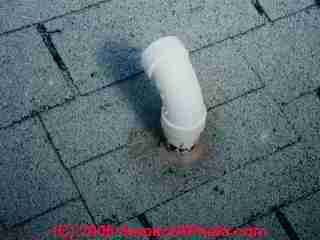
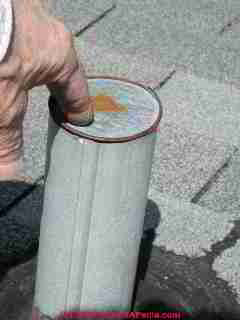
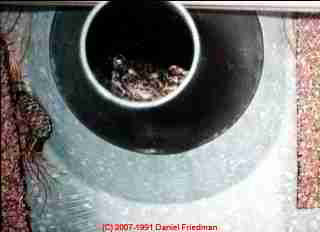
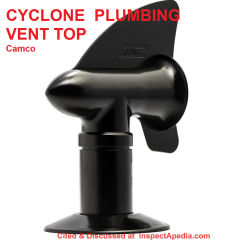
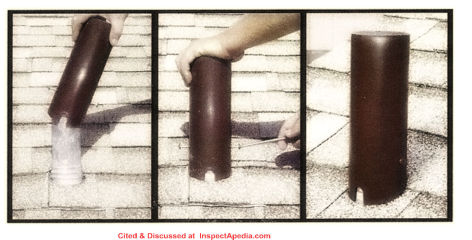
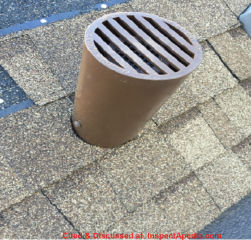
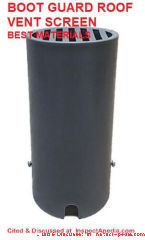
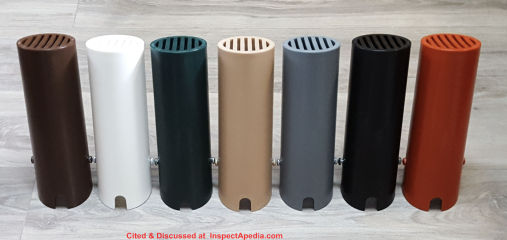
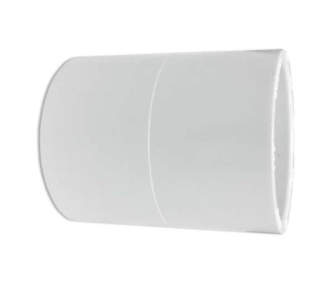
No one has commented yet. Be the first!